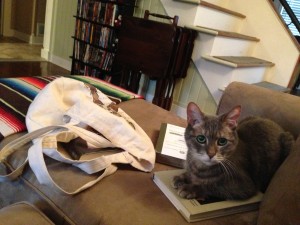I’m at a truly odd point of my PhD process. That is: the in-between place.
Right now, I’m not quite a “Student” not quite a “Candidate”. I’ve passed 2/3 of my exams, but I still have 1/3 to go before I can say that I’ve completed them and, thereby, moved into the next stage of my PhD.
Explaining this to folks who are outside of the academy has been an interesting process. There are many terms and definitions that are commonplace to us denizens of the ivory tower but sound mostly the same to folks on the outside. As such, I’ve found myself having the same conversation over and over again (which I don’t begrudge; it’s wonderful that

…bringing this one back because it’s quite possibly my favorite pic I’ve ever posted on the blog. I am, in fact, a Shakespeare Paladin.
folks in my life care enough about me to ask questions about this process). However, since I’ve found that it is a common communication issue, I also think it would be useful to have an easy-access reference guide for those less-than-familiar with this process.
So, in case you have a struggling Graduate Student in your life, here’s some good vocabulary for you to know:
A.B.D.: Stands for “All But Dissertation”. This is a colloquial term that we use to refer to someone who has passed all of her degree requirements except writing the book. It’s also a way to refer to someone who is a….
Doctoral Candidate: Someone who has passed all degree requirements except the dissertation (generally means that the dissertation is in process). This is not to be confused with…
Doctoral Student: (Yes, this is a different thing, only in academia….) A Doctoral Student is someone who is in progress with the early parts of the degree (coursework, exams, etc.). Alternately, someone who has been accepted into a program but hasn’t started that program yet. As an aside: mixing up these two terms can be… awkward. You are either giving someone credit for work they did not already do and thereby devaluing that work, or taking away a hard-earned benchmark. I have, over the years, been called by well-meaning onlookers a “Doctoral Candidate” and even “Dr. Rosvally” before needing to quickly correct this. In an industry that functions almost exclusively on the importance of words, it is not considered supportive to devalue those words by using them outside of their accepted meanings. In short: try to use the appropriate title for someone in the process of his PhD. Don’t worry; you have the rest of his lives to call him “Dr.”.
Comprehensive Exams: Or “Comps” (yes, if you’ve been following this blog at all over the last few months, you already know what this means). The exhaustive, stressful exam generally administered at the end of coursework (sometimes administered in steps over the course of coursework) that proves a student is a competent generalist in her field and, thereby, is qualified to move on to the next step.
Orals: Sometimes, the comps include an oral examination as well as a written examination (this is the case in my department).
Dissertation: The large piece of writing you produce as one of the final steps in your PhD process. This is an exhaustive, original piece of scholarship and (presumable) a PhD’s first long-term project. It is sometimes colloquially shortened to “diss”. It is not to be confused with a…
Thesis: This generally refers to the culminating project of a Master’s degree. It is shorter than a dissertation and with less expectations of originality. The big difference between a Master’s degree and a doctoral degree is that a Master’s degree shows that you have mastered a given field while a doctoral degree shows that you have added something to the field. The capstone writing projects for each degree exhibit this difference; the thesis is based upon work that has already been done and the dissertation is something completely new.
Home Institution: The place where a scholar calls “home”. This implies that the scholar is somehow in residence at the institution, either as a student, candidate, or professor.
Committee: An assembled group of scholars (who, ideally, have some expertise in the field which the candidate is writing about) who evaluate the dissertation for its worthiness

alternately, you could find a partner to go dance in a bookstore with. No word of a lie, this is a past time of mine.
as an original piece of scholarship. Generally, this group consists mostly of scholars from the candidate’s home institution with one outside reader for consistency/fairness/representation of the field at large.
So now that you’re able to use the lingo, your academic street cred just went up by at least 10%. Seriously. Go have a latte and stand on the steps of the library chatting about your most recent re-read of a major canonical work and see if I’m wrong.
Happy Wednesday, everyone!



